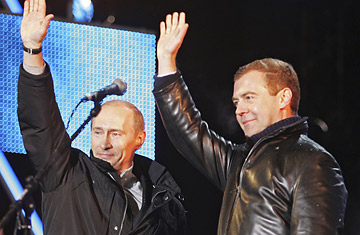
Vladimir Putin, left, and Dmitry Medvedev wave to their supporters during a concert to mark presidential elections on Moscow's Red Square, March 2, 2008.
In mid-December, Vladimir Putin settled Russia's succession question by declaring his support for Dmitri Medvedev, a deputy prime minister and former Putin chief of staff. Soon after, while I and other TIME editors were in Moscow preparing to interview Putin as TIME's Person of the Year, Medvedev returned the favor and announced that he would in turn endorse Putin as Russia's next Prime Minister. A top Kremlin aide told us the news with great excitement. When we dryly suggested that Putin may possibly have had a hand in Medvedev's decision, even this Kremlin loyalist had to laugh. To heighten the joke, he pretended to be Putin, displaying surprise and elation at the endorsement: "Moi?!"
The transition, in other words, is fooling no one.
Medvedev won more than 70% of the vote Sunday in an election that outside monitors have labeled as flawed, in large part over charges of Kremlin intimidation of opposition candidates.
Medvedev's rise means the presidency is now in the hands of a Putin loyalist. Yet that doesn't mean Medvedev will have broad authority. True, since the fall of the Soviet Union, power has been centered in the office of the President. Boris Yeltsin was flawed and ineffective, yet held significant powers. Putin inherited them, enhanced them, and transformed the presidency into a source of pride and respect for many Russians. It didn't hurt, of course, that world prices for oil and other Russian natural resources hit sky-high levels, enabling Putin to dole out favors and goodies to lift Russia up from the chaos of the immediate post-Soviet years and secure his position.
But now that Putin is moving office, it seems safe to assume that real power will reside with the Prime Minister. In case there are any doubts, Putin himself recently said as much: "The Cabinet, headed by the Prime Minister, is the highest executive authority in the country." That means more of the same for Russia. That's good news, or bad, depending who you are.
When Yeltsin ruled Russia, urban intellectuals were optimistic about the future and the possibilities of democratic change. Most other Russians, however, sank into despair as the economy withered and the state's assets were handed out to corrupt insiders. Under Putin, attitudes have flipped. Now it's the intellectuals who are disgusted with his administration's habitual disregard for democracy, its tendency to harass opposition figures and intimidate media outlets that dare to criticize the state. Average Russians, on the other hand, seem mostly to accept Putin's grand bargain: I'll improve your standard of living if you keep your mouth shut. It's similar to the deal that Deng Xiaoping and his successors have offered the Chinese: there will be no democracy, but if you behave, we will give you opportunities to get wealthy.
Putin's popularity ratings are routinely around 70%.
The constitution barred Putin from running for a third consecutive term. And he has sought international plaudits for stepping aside and not trying to rig a constitutional change to keep himself in the presidency. If it turns out that he misses the old office, he can always run again in four years.
